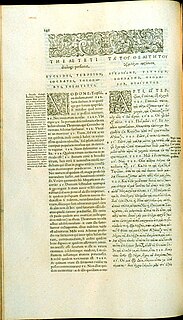A thesaurus or synonym dictionary is a reference work for finding synonyms and sometimes antonyms of words. They are often used by writers to help find the best word to express an idea:
...to find the word, or words, by which [an] idea may be most fitly and aptly expressed

The Talmud is the central text of Rabbinic Judaism and the primary source of Jewish religious law (halakha) and Jewish theology. Until the advent of modernity, in nearly all Jewish communities, the Talmud was the centerpiece of Jewish cultural life and was foundational to "all Jewish thought and aspirations", serving also as "the guide for the daily life" of Jews.
Desktop publishing (DTP) is the creation of documents using page layout software on a personal ("desktop") computer. It was first used almost exclusively for print publications, but now it also assists in the creation of various forms of online content. Desktop publishing software can generate layouts and produce typographic-quality text and images comparable to traditional typography and printing. Desktop publishing is also the main reference for digital typography. This technology allows individuals, businesses, and other organizations to self-publish a wide variety of content, from menus to magazines to books, without the expense of commercial printing.
Instantiation or instance may refer to:
Yellow card may refer to:

Stephanus pagination is a system of reference and organization used in modern editions and translations of Plato based on the three-volume 1578 edition of Plato's complete works translated by Joannes Serranus and published by Henricus Stephanus in Geneva.
Dao, Dão or DAO may refer to:

The Exhaustive Concordance of the Bible, generally known as Strong's Concordance, is a Bible concordance, an index of every word in the King James Version (KJV), constructed under the direction of James Strong. Strong first published his Concordance in 1890, while professor of exegetical theology at Drew Theological Seminary.

News design is the process of arranging material on a newspaper page, according to editorial and graphical guidelines and goals. Main editorial goals include the ordering of news stories by order of importance, while graphical considerations include readability and balanced, unobtrusive incorporation of advertising.
Memory segmentation is an operating system memory management technique of division of a computer's primary memory into segments or sections. In a computer system using segmentation, a reference to a memory location includes a value that identifies a segment and an offset within that segment. Segments or sections are also used in object files of compiled programs when they are linked together into a program image and when the image is loaded into memory.
Parenthetical referencing, is a citation system in which in-text citations are made using parentheses. They are usually accompanied by a full, alphabetized list of citations in an end section, usually titled "references", "reference list", "works cited", or "end-text citations". Parenthetical referencing can be used in lieu of footnote citations.
Pagination, also known as paging, is the process of dividing a document into discrete pages, either electronic pages or printed pages.
The Vancouver system, also known as Vancouver reference style or the author–number system, is a citation style that uses numbers within the text that refer to numbered entries in the reference list. It is popular in the physical sciences and is one of two referencing systems normally used in medicine, the other being the author–date, or "Harvard", system. Vancouver style is used by MEDLINE and PubMed.

Bekker numbering or Bekker pagination is the standard form of citation to the works of Aristotle. It is based on the page numbers used in the Prussian Academy of Sciences edition of the complete works of Aristotle and takes its name from the editor of that edition, the classical philologist August Immanuel Bekker (1785–1871); because the Academy was located in Berlin, the system is occasionally referred to by the alternative name Berlin numbering or Berlin pagination.

Diels–Kranz (DK) numbering is the standard system for referencing the works of the ancient Greek pre-Socratic philosophers, based on the collection of quotations from and reports of their work, Die Fragmente der Vorsokratiker, by Hermann Alexander Diels. The Fragmente was first published in 1903, was later revised and expanded three times by Diels, and was finally revised in a fifth edition (1934–7) by Walther Kranz and again in a sixth edition (1952). In Diels–Kranz, each passage, or item, is assigned a number which is used to uniquely identify the ancient personality with which it is concerned, and the type of item given. Diels–Kranz is used in academia to cite pre-Socratic philosophers, and the system also encompasses Sophists and pre-Homeric poets such as Orpheus.
Aksharapalli is a certain type of alphasyllabic numeration scheme extensively used in the pagination of manuscripts produced in India in pre-modern times. The name Aksharapalli can be translated as the letter system. In this system the letters or the syllables of the script in which the manuscript is written are used to denote the numbers. In contrast to the Aksharapalli system, the ordinary decimal system is called the Ankapalli system.
This page is based on this
Wikipedia article Text is available under the
CC BY-SA 4.0 license; additional terms may apply.
Images, videos and audio are available under their respective licenses.





